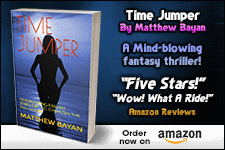SOPHIE'S CHOICE FOR WRITERS
- by Matthew Bayan
- Dec 24, 2017
- 2 min read
SOPHIE’S CHOICE FOR WRITERS
I think it would be helpful to contrast two key elements of a story: setting and immediate scene. I’ve talked about immediate scene before; it’s writing that occurs in the moment. It’s a close POV where the reader is experiencing what is happening as it happens.
Dialogue is usually immediate scene, unless the dialogue is recounting something that occurred off-stage, out of the sight of the reader. Usually something in the past.
Setting is that element that tells the reader when and where the story is taking place. It creates an atmosphere or context for the story.
Here’s the conflict. Traditionally, stories started out with a description of setting. In both movies and books this was called “exposition.” However, in recent years, exposition has shrunk more and more. We have shorter attention spans. We want things to get
moving. We don’t want a long explanation of background.
That’s why “immediate scene” has become more important to readers and moviegoers. Audiences want to get right into the story, be immersed in it. The challenge for writers is to plunge in, yet introduce the details of setting without bogging down the scene.
Think of TV shows such as, Law and Order, CSI, Gray’s Anatomy. The show usually starts with some kind of emergency or a murder or some other crime. The audience doesn’t know the context at the start. The pieces start to get revealed as the show progresses.
How do James Bond movies start? With an action scene. In Casino Royal, the first ten minutes – the teaser – involves Bond chasing some operative in the most spectacular footrace I have ever seen. It looks like they’re in the tropics, but we don’t know where. We don’t know who the guy is who’s running from Bond. We don’t know why Bond is chasing him. This is a far cry from Dickens who would have given the dates of birth of pursued and pursuer, walked us through their grammar school days, and given the shoe size of everyone in the scene.
I’m NOT saying to start a novel with an action scene. I’m saying to get the reader into what’s happening right away. Forget prologues, world-building, data dumps, and a lot of description right up front. Work the setting and world-building into the story in pieces as you stay in immediate scene as much as possible.
The teaser that launches immediate scene is now expected by audiences. When we send queries to agents, they expect immediate scene too. The slow burn is something bestselling authors can afford because they’ve already captured an audience who is more willing to give them some leeway. But if you’re starting out, stay in immediate scene as much as possible.
Check back frequently because new blog posts appear weekly.
Please check out my latest novels. Just click on a cover below to be whisked magically to Amazon.
The late, bestselling Sci-fi legend, A.C. Crispin, called TIME JUMPER “a mindblowing fantasy thriller.”
Author and critic, David Corbett, called THE FIRECRACKER KING "a wicked, marvelous book."
Caroline Leavitt, New York Times #1 bestseller said, "I loved it!"













Comments